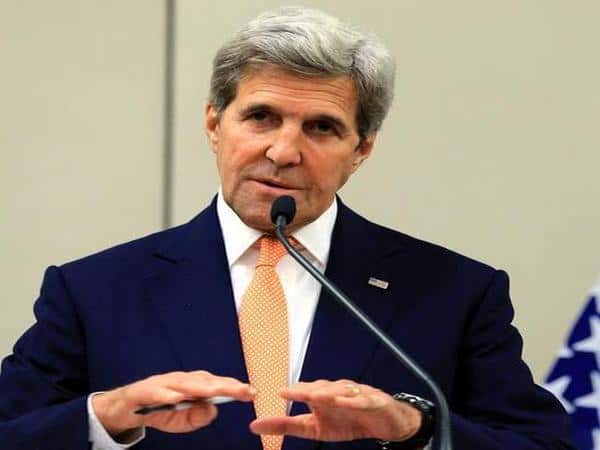Kigali (Rwanda): US Secretary of State John Kerry on Thursday reached Kigali in Rwanda where he will attend the 28th Montreal Protocol meeting on the last day on Friday.
“US Secretary of State John Kerry will aim to arrive at strong amendments to the Montreal Protocol to go for climate-friendly cooling system and timely phase out of the hydroflourocarbons (or HFCs),” a senior State Department official told IANS here.
HFCs are super greenhouse gases used in refrigeration and air-conditioning.
The negotiations in Kigali have been on since October 10 to reach a global agreement on an ambitious amendment to the Montreal Protocol to phase down the production and consumption of HFCs globally.
Heat-trapping substance HFCs — the refrigeration and air-conditioning coolants — though not harming the ozone layer, have a high global-warming potential.
Official sources said Kerry would have one-to-one negotiations with Indian Minister for Environment Anil Dave and senior Chinese and European Union functionaries.
“Before attending the Montreal Protocol meeting, Kerry will visit the Kigali Genocide Memorial and after that he will attend the ongoing negotiations. After that he will return to the US,” said the official.
The Kigali Genocide Memorial, an important landmark here, is the final resting place for more than 250,000 victims of the genocide against the Tutsi in Rwanda. It honours the memory of the more than one million Rwandans killed in 1994.
“We are optimistic that some agreement will reach to phase down the consumption of HFCs,” said the official.
Nearly 200 nations are meeting in Kigali from October 10-14 to try to agree on an arrangement to phase down the HFC gases.
Taking the lead, Indian Minister for Environment Anil Dave on Thursday announced measures to control the emissions of trifluoromethane (HFC-23), a super greenhouse gas.
Declaring that India has taken the lead on climate issues, he told IANS: “We are going ahead for releasing the order for incinerating the HFC-23 by-products of HCFC-22 gas.”
HFC-23 is released as a by-product during the manufacturing of a commonly used refrigerant gas, chlorodifluoromethane (HCFC-22). The global warming potential of HFC-23 is 14,800 times more than that of CO2, making it an extremely potent greenhouse gas.
The Minister said in a statement that companies will have to internalise the cost of this environmental externality, take care of downtime and run the incinerators to ensure that HFC-23 is not released in the atmosphere.
“We are very much optimistic that some major announcements are likely to be announced tomorrow (on Friday),” Dave told IANS.
An analysis released here by the Centre for Science and Environment (CSE) shows that if China alone decides to take 2020-22 as baseline while other developing countries, including India, take 2024-26 as baseline, HFC emissions equivalent to 10 billion tonnes of CO2 emissions can be reduced.
“This is two times the total yearly CO2 emissions by the US,” it said.
The baseline year determines the level at which the HFC consumption in countries are capped.
“Our analysis clearly shows that the Indian proposal of having one baseline for China and another for the remaining group of A5 (developing) countries is ambitious from climate benefit perspective,” Chandra Bhushan, Deputy Director of the Delhi-based Centre for Science and Environment, told IANS here.
He said the developed countries are trying to push others to the 2020-22 baseline but this shift will have insignificant impact on the climate benefit. “This is not an issue which is important enough to create discord within parties.”
A general consensus, he said, seems to be emerging within the A5 parties to have a dual baseline.
One group of countries, including China, seems to favour average HFC consumption during 2020-22 as the baseline.
Another group, that includes India, seems to opt for average HFC consumption during 2024-26 as the baseline, he said.
In a landmark decision in November last, the 197 Parties of the Montreal Protocol agreed to the “Dubai Pathway on HFCs” which commits the Parties to “work within the Montreal Protocol to an HFC amendment in 2016 by first resolving challenges by generating solutions in the contact group on the feasibility and ways of managing HFCs”.
(Vishal Gulati is in Kigali in Rwanda to cover the 28th Meeting of the Parties to the Montreal Protocol. He can be contacted at vishal.g@ians.in)
—IANS

